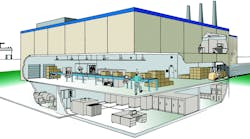It sounds like a pretty simple equation: Electrical distributors help manufacturers grow their market share, and manufacturers help distributors earn a margin for their services. But do manufacturers and distributors really want the same things? In our 26 years working with electrical manufacturers and distributors, we have found that manufacturers always want the top distributors in each trading area in the United States and the top distributors that appeal to their market segment brands. On the flip side, we have found that distributors always want the top brands in the categories, trading areas and market segments they serve.
Amid this prolonged drop in consumer spending, residential investment and business spending, electrical manufacturers and distributors need to deliver on key factors they value most from each other. In my firm's recently published “Best Distributor and Best Manufacturer” research study, we explored partner relationships in the electrical wholesaling industry. We asked 24 electrical manufacturers, “What are the top three qualities that make up your best distributors?” and asked 40 electrical distributors, “What are the top three qualities that make up your best manufacturers?” All participants were assured complete anonymity and were told that their responses would be formatted in aggregate fashion to protect their individual identities. This article summarizes the findings of this research and I believe provides a call to action to help manufacturers and distributors solidify their relationships with each other.
Manufacturers Speak Out
Given the current economic downturn, the following manufacturer comments stand out: “Win-Win attitude! Our best distributors exhibit this type of behavior,” said one manufacturer. “We clearly work harder and better for those distributors who have a win-win orientation. There is a great growth leverage that results from this type of attitude/behavior.”
“The best distributors mutually plan with their manufacturers, pursue new avenues of business, look for niche areas to grow, talk to their key end users to determine their issues/opportunities and follow their advice,” said another manufacturer. “They don't talk about the slow economy. They are proactive with their key manufacturing partners.”
The overwhelming majority of the manufacturer research sample (92 percent) placed the most value on electrical distributors that engage in a corporate strategic planning process along with joint distributor-vendor strategic business planning. When asked, “What are the Top 3 qualities that make up your best distributors?” the responses fell into seven categories. They are (with the first being the most important): joint planning for profitable success; effective sales force deployment; relationship based upon mutual trust; respect and loyalty; inventory stock position; strong financial management; customer service culture and logistics; and distributor business processes.
#1. Joint planning for profitable success
92 percent of the manufacturers who responded to the survey want to do business with electrical distributors that create joint distributor-manufacturer strategic business plans that contain the following:
-
Short- and long-term market penetration and growth strategies that include key sales initiatives, new product initiatives, new vertical market opportunities and new niche growth opportunities.
-
Differentiation strategies demonstrating increased value to customers.
-
Quarterly activities and quarterly reviews that include training, joint calls and joint promotions.
-
Support and accountability for execution of plans throughout the organization from senior management to every branch location.
-
Persistence in pushing manufacturers for unusual and creative ways to gain sales.
#2. Effective sales force deployment
58 percent of survey respondents want to do business with electrical distributors that deploy effective sales teams that accomplish the following:
-
Excellence in end-user penetration.
-
A focus on friendly, responsive and knowledgeable value-added solution selling and on being order makers instead of order takers.
-
Anticipation of customer needs, particularly with non-traditional product categories.
#3. Relationship based upon mutual trust, respect and loyalty
46 percent of survey respondents want to have relationships with electrical distributors based upon mutual trust, respect and loyalty. This includes the following:
-
Loyalty to the brand with limited or no competitive shelf support.
-
Support for the manufacturers' sales team throughout distributor organization.
#4. Inventory stock position
46 percent of survey respondents want to do business with electrical distributors who:
-
Have a purchasing policy reflecting a strategic approach to its suppliers, not just a transactional approach.
-
Support the manufacturer's full line and maintain significant local inventories.
-
Are willing to make necessary additional inventory investments to capitalize on new market opportunities.
#5. Strong financial management
33 percent of survey respondents want to do business with electrical distributors that:
-
Have strong financial management capabilities, including gross margin, inventory turn and rebate management.
-
Pay bills on time and do not take unwanted debits.
#6. Customer service culture and logistics
17 percent of survey respondents want to do business with electrical distributors that:
-
Differentiate themselves with superior customer service.
-
Provide adequate warehouse capacity and excellent logistical capabilities to achieve high order fill rates, order accuracy and on-time deliveries.
#7. Distributor business processes
13 percent of survey respondents want to do business with electrical distributors that:
-
Drive their efficiencies through technologies that mutually reduce operating and transaction costs.
-
Provide compatible systems to the manufacturer through EDI, IDW, etc.
This research raises the following fundamental questions: If some electrical distributors are not willing to meet these key success factors, why do manufacturers continue to do business with them? Would they be better served by moving toward more selective distribution where distributors must meet the seven criteria reviewed in this article?
Distributors Speak Out
When asked, “What are the top three qualities that make up your best manufacturers?” the responses fell into five categories. They are (with the first being the most important): ease of doing business and world-class logistics; manufacturer sales and marketing team support; joint planning for profitable success; product innovation, product quality and competitive pricing; and limited/selective distribution. Said one electrical distributor who mirrored the opinions of many respondents, “As the economy staggers, I am worried these top three manufacturer qualities will become even more elusive.” Another respondent said they prize manufacturers who “work with us to help us grow our business regardless of the business environment.” Added another, “Should we talk about the important stuff or just the usual quality, availability and price?”
#1. Ease of doing business and world-class logistics
63 percent of survey respondents want to do business with electrical manufacturers who provide hassle-free methods while reducing the cost of doing business by:
-
Using a well-developed EDI system with all of the standard and industry-accepted transaction sets for transactional excellence.
-
Providing reliable, consistent supply chain support including providing best-practice order fill, order accuracy and on-time delivery rates.
-
Operating user-friendly websites with reliable up-to-date information.
#2. Manufacturer sales and marketing team support
63 percent of survey respondents want to do business with electrical manufacturers who provide energetic, proactive and knowledgeable service through their independent manufacturer reps or their factory-employed inside and outside sales and marketing teams including:
-
Using best practices to launch new products.
-
Successful joint sales calls.
#3. Joint planning for profitable success
55 percent of survey respondents want to do business with electrical manufacturers who commit at the senior management level to collaborate together to align and achieve mutually profitable goals including:
-
Having a culture that is relationship-focused rather than order-focused.
-
Sharing a vision of the future.
-
Understanding the electrical distributor's business model and positions in the market they serve.
#4. Product innovation, product quality and competitive pricing
50 percent of survey respondents want to do business with electrical manufacturers that:
-
Provide innovative products that come to market in a timely manner.
-
Competitively price new and innovative products with all channels.
#5. Limited/selective distribution
35 percent of survey respondents want to do business with electrical manufacturers who:
-
Utilize a select number of distributors in a given geography.
-
Provide advantageous pricing to a select group of distributors based upon performance.
What both channel partners need to do
Based on the responses to this survey, I believe manufacturers and distributors need to:
-
Hold honest and candid meetings to review the results of this research study.
-
Determine and agree upon specific actions each must take to be the best channel partner to each other.
-
Develop annual long-range strategic plans and share these plans with their channel partners.
-
Craft joint manufacturer-distributor strategic plans.
-
Meet quarterly to review and ensure steady, consistent joint growth strategy execution progress.
Amid our current economic storm, electrical distributors and manufacturers who diligently follow those actions they deem most valuable to one another will create competitive advantage and mutually grow market share.
Thomas J. O'Connor owns Farmington Consulting Group, Farmington, Conn. He is a growth strategy consultant for electrical distributors, manufacturers and manufacturers' representatives and a contributing writer for EW. You can call him at (860) 676-7876 or contact him via e-mail at [email protected]. His company's website is www.fcgltd.com.
To-do Lists for Manufacturers and Distributors
Manufacturers' to-do list
Manufacturers need to commit to selective distribution with electrical distributors who:
- Execute strategic planning and are willing to invest in joint growth strategies to drive revenue and improve profitability.
- Deploy friendly, responsive and knowledgeable counter, inside and outside salespeople that excel at end-user penetration.
- Are loyal to their brand with limited or no competitive shelf support.
- Support the manufacturer's sales team throughout the organization.
- Have a purchasing policy that reflects a strategic approach, not just a transactional approach.
- Are financially sound and savvy.
- Differentiate with superior customer service.
- Drive efficiencies through technologies that mutually reduce operating and transaction costs.
Distributors' to-do list
Distributors need to commit to selective manufacturers who:
- Support selective distribution with a limited number of distributors in a given geography.
- Participate in annual joint structured business-planning sessions with their top management, including overall sales goals by product category, key market and account opportunities and challenges, key initiatives and specific action plans to achieve all goals.
- Hold joint sales-planning sessions with their sales team and the distributor's branch sales teams to strengthen the channel partnership.
- Develop specific strategies focused on growing profitable business together at every branch location.
- Provide transactional excellence with a well-developed EDI system that utilizes standard and industry-accepted transaction sets.
- Offer a reliable, consistent supply chain providing best-practice order-fill, order-accuracy and on-time delivery rates.
- Provide a user-friendly website with reliable, up-to-date information.
- Deliver best-practice marketing for new product launches.
- Execute successful joint sales calls.
- Promote advantageous pricing to a select group of distributors based upon performance.








